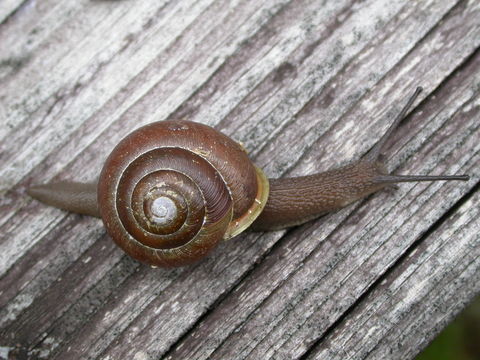Classification
Scientific Name: Patera panselenus
Common Name: West Virginia Bladetooth
The common name, West Virginia Bladetooth, was obtained from
its anatomical structure and habitat. It is
only found in the area of West Virginia. It also received its name
due to its large tooth-like structure at the base of the
shell (Dourson, 2010).
Domain: Eukarya
Kingdom: Animalia
Phylum: Mollusca
Class: Gastropoda
Order: Stylommatophora
Family: Polygyridae
Genus: Patera
Species: Patera panselenus
Eukarya:
Eukarya's Latin meaning is "truly nuclear", defined as
containing both a nucleus and membrane bound organelles
(Hickman et al., 2011).
Animalia:
To be in the Kingdom Animalia one must be multicellular
with true tissues and organs (Hickman et al., 2011). Unlike the
Kingdom Plantae, Animalia lack cell walls and are heterotrophic
(Hickman et al., 2011).
Mollusca:
Animals in Phylum Mollusca are soft-bodied coelomates
typically contained in a calcium carbonate shell (Hickman et
al., 2011). Some Mollusks have an open circulatory system as
well as a well developed sensory and nervous system (Hickman et
al., 2011).
Gastropoda:
Class Gastropoda known to be the most diverse
class of Mollusks (Hickman et al., 2011). They are apart
from other classes because of there 180 degree twisting of their visceral
mass called torsion (Hickman et al., 2011).
Stylommatophora:
Order Stylommatophora contains snails and slugs
(Hickman et al., 2011). All of
which contain a vascularized mantle which then becomes an air-breathing lung
(Hickman et al., 2011).
Polygyridae:
Family Polygyridae contains specifically land snails
and slugs (Encyclopedia of Life, 2012). These are mainly found in eastern
and western parts of northern America as well as northern
central America (Encyclopedia of Life, 2012). The muscles of
their retractable eyes are connected to the pharynx in a single
muscle strand and their jaws are ribbed (Encyclopedia of Life,
2012).
Patera:
Patera gets its name because of the Latin meaning,
saucer shaped (Encyclopedia of Life, 2012). The Latin meaning
emphasizes this particular genus of snail to have a depressed
saucer shaped shell (Encyclopedia of Life, 2012).
Patera panselenus:
Patera panselenus
is brown in color with a glossy shine to its
depressed saucer-shaped shell (Dourson, 2010).
Patera panselenus's shell
contains exactly five whorls (coiling twists) in its shell (Dourson,
2010). They contain a large parietal tooth as well as a small
basal tooth of the shell (Dourson, 2010).